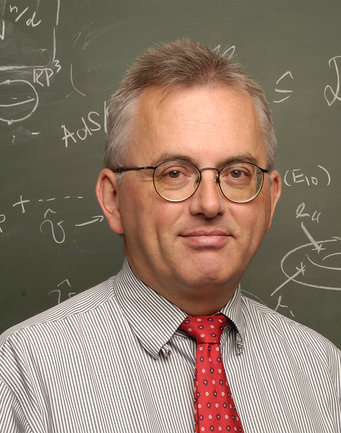Prof. Hermann Nicolai receives Einstein Medal 2010
For “his outstanding contributions to theoretical physics”, the Albert Einstein Society in Bern is honouring Dr. Hermann Nicolai, Director at the Max Planck Institute for Gravitational Physics, with the Einstein Medal 2010. This distinction is given for outstanding scientific research or other efforts that focus on the work of Albert Einstein. The Medal will be presented at an official ceremony at the end of May 2010 at the University of Bern.
Einstein in Bern
During his time as “technical expert level three” at the patent office in Bern (1902-1909), Einstein was extremely productive in science. He formulated not only his special theory of relativity, but, with his work on Brownian motion, was also one of the founders of statistical mechanics (at a time when the existence of atoms was still controversial). And he provided the theoretical explanation for the photoelectric effect - for which he received the Nobel Prize in Physics in 1921.
The Einstein Medal of the Albert Einstein Society

For 30 years, the Medal has been bestowed annually on individuals for their outstanding scientific efforts in a research area founded by Einstein. The list of prize winners reads like a Who’s Who of modern physics: the first recipient was Stephen Hawking in 1979; other prize winners include Edward Witten, Rudolf Mößbauer, John Archibald Wheeler, Roger Penrose and Kip Thorne. Hermann Nicolai is the sixth German researcher to be honoured.
“I am delighted about this recognition for my scientific work,” says Prof. Nicolai, whose research area - quantum gravity - was also one of the major interests of Einstein who, after the completion of the general theory of relativity, searched up until his death in 1955 for a unified field theory that would bring relativity and quantum theory in accordance.
Professor Dr. Hermann Nicolai (b. 1952), after studies in physics and a doctorate at the Universität Karlsruhe, held a position as assistant at the Universität Heidelberg. From 1979 – 1986 he conducted research at CERN in Geneva. After professorships in Karlsruhe and Hamburg, he was appointed in 1997 Director of the “Quantum Gravity and Unified Theories” Department at the Max Planck Institute for Gravitational Physics (Albert Einstein Institute) in Potsdam. In 1991 he received the Otto Klung Prize for Physics.
A new physics
The search for a unified theory of all interactions, and thus the explanation of fundamental physical laws from a uniform principle is one of the greatest challenges facing theoretical physics in the 21st century. Such a theory would necessarily have to lead to a unification of quantum theory and Einstein’s general theory of relativity. The Albert Einstein Institute is one of the few institutions in the world where all of the principal directions of the current research are represented. In the Institute’s Department headed by Hermann Nicolai, both the superstring theory (M-theory) with its modern developments and canonical quantum gravity are represented. The string theory is based on a radical modification of Einstein’s general relativity theory and the standard quantum field theory at the shortest possible distances, the so-called Planck-length. In string theory, the fundamental constituents of matter are threadlike (and not point-like). With the canonical approach, in contrast, the quantification of geometry and the search for a background independent formulation are in the foreground.
The Albert Einstein Society
The aim of the Albert Einstein Society, which was founded in Bern in 1977, is to make Einstein's scientific legacy available to a broad general public. Among other things, it made Einstein’s apartment in Bern publically accessible and bestows the Einstein Medal annually to outstanding researchers.










